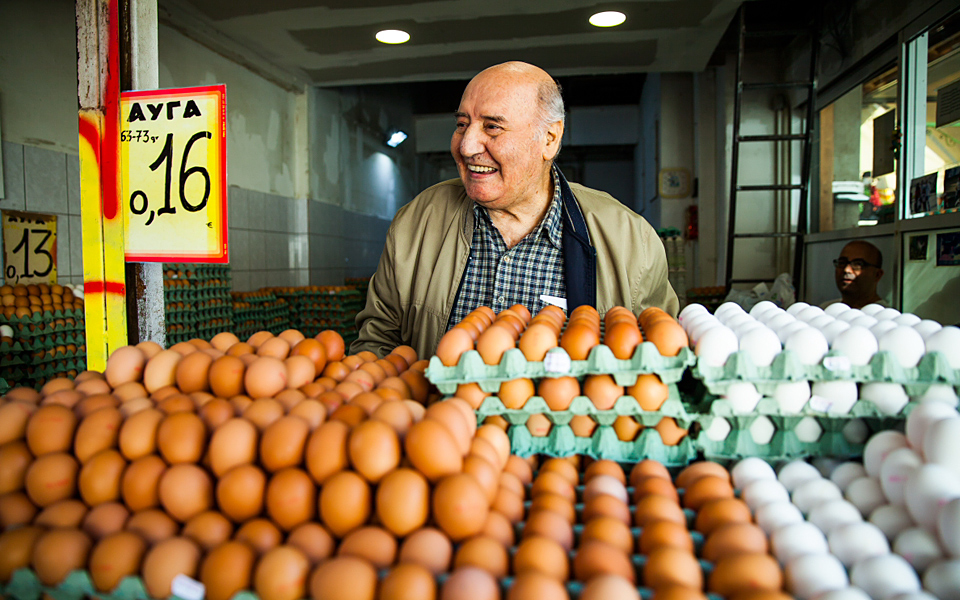On the shelves and worktops, the heart of the old Athenian commercial center still beats. Some declare they’re “as old as the Acropolis”. Other younger members have stepped in to continue their family business name. They are separated by a few streets and united by a nostalgia for the old Athens – and the style in which they greet you – authentic, loud and heartfelt. Each of them preserves the scents and flavors of their beloved neighborhood on the shelves of their stores, warehouses and stalls. From Agia Irini to Varvakeio and Psirri to Ermou, the city is full of living legends.
KOSTAS IOSIFIDIS
Selling eggs through the decades
A simple stool, nested behind a mountain of eggs, in his store on the corner of Armodiou and Sokratous streets, has been Kostas Iosifidis’ favorite working spot for 63 years. Of the thousands of eggs stacked ceiling-high, his only favorite “has always been the one that drops in a scalding hot pan, to be fried in a little oil.”
Born in Kavala, Kostas came to Athens on his 15th birthday. He was hired as a salesman in the very same store that he now owns. In those days, apart from eggs, the store sold “potatoes and onions, wholesale, in sacks.”
“I saved my wages, worked hard and always exhibited a light touch, which is essential in the egg business,” he says, recounting how he rose from salesman to partner and, in the mid-1980s, acquired the business. “Eggs require gentle hands. A rare gift. One day, I remember an employee of mine losing his footing while carrying stacks of them. We’re talking about 1,200 broken eggs, so you can’t imagine what the store looked like after that!”
Although his sons, Leonidas and Andreas, have taken over the store, Kostas insists on promptly getting to work every morning. “Here you’ll find whatever kind of egg you’re looking for. We stock five kinds, arranged by size. From small, weighing 40g, to XXL, with a weight of 80g.”
Whichever the category, all eggs are guaranteed to be “fresh, alive.” “How do I know they’re fresh,” I ask him. “You must listen to the egg,” he whispers. He picks one up from a stack in front of us, puts it to his ear and shakes it, like a busted wind-up watch. “When the egg is fresh, it won’t talk to you. When it’s been sitting there for a while, the yolk gathers in the center and you can feel it move.” Kostas lives in Nea Makri, a suburb in eastern Attica, but his heart beats in the alleyways, the ouzo bars and the old shops of Psyrri.
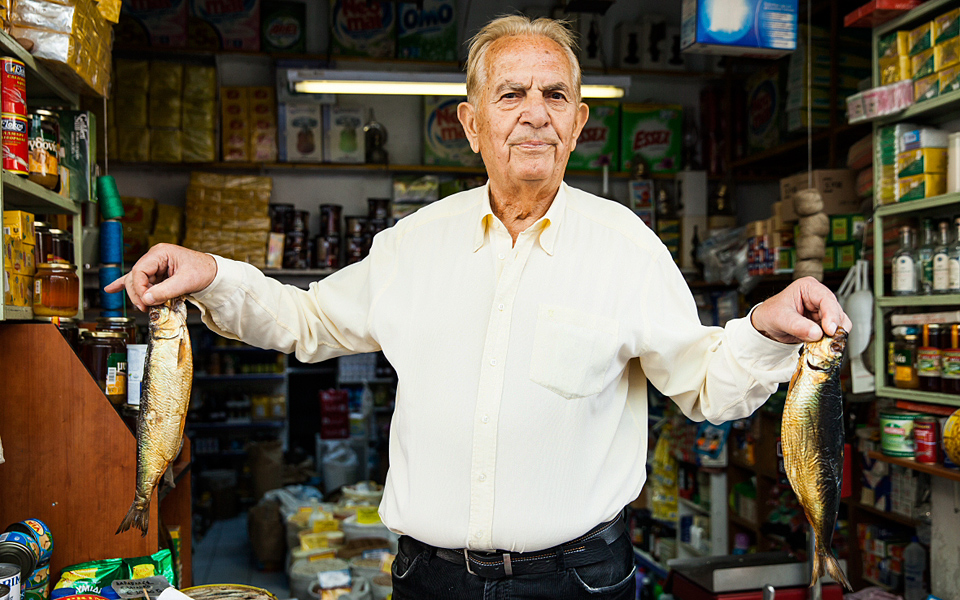
ILIAS KONIARIS
Four decades in his corner market
“Excuse me, sir? How much for this fish?” “If you’re older than 80, it’s free, sir,” answers Ilias Koniaris, wrapping a smoked halibut, insisting that the elderly gentleman take it, without paying. “I have a special rapport with my customers,” he says. Since 1975, Athenians have been climbing down the steep stairs of his small underground corner store, located at 4 Sokratous Street, to buy everything and anything, from shampoo and cleaning products, to salted fish and beans.
“All of today’s supermarket moguls started out from this street here. I know each one of them by their first names. They left, we stayed.” He remembers the fruit stalls in the market when they were still peddling their produce from sheds.
“The neighborhood was never bourgeois, but it had class, respect and honor. But then, the area went downhill. It happened in the 1990s, when the stores changed hands and the old owners, who loved the city center, left. The next 20 years were difficult for store owners. We saw everything here. From gangs to drug dealing. In the last five years things have started to pick up. We feel safer, and things are getting better,” he says. Ilias lives in an apartment in Psyrri and likes strolling on Dionyssiou Areopagitou under the Acropolis or sitting in a taverna in Pasalimani, Piraeus.
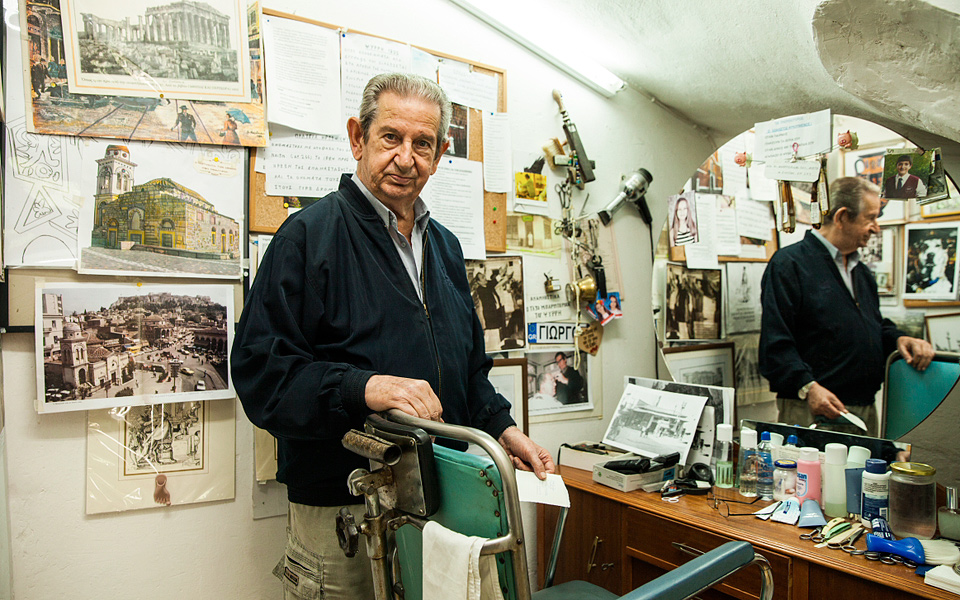
GIORGOS GALITIS
The last barber of Psyrri
“I’ve worked in this barbershop a total of 159,012 hours,” says 82-year-old Giorgos Galitis, stating his love for the straight razor. Although having already retired last year, Giorgos is still operating his store, the last traditional barbershop in Psyrri. Opening every day at one in the afternoon, his barbershop is located deep in a ground-floor corridor of 31 Agion Anargyron Street. “Nowadays I only open for my friends,” he says, “as well as to allow tourists become acquainted with the old school barbershop.”
His shop is no bigger than 15 square feet, just enough space to fit a couple of people and a barber chair. “People have asked me to sell it to them. But I can’t just sell the past.” When friends visit, he adds water to the boiler without even asking them first, and offers a traditional straight razor shave, which customers have dubbed a “man spa.”
“I’ve worked hard my whole life. For 30 years, I worked two jobs, barber and house painter. The secret is to never get discouraged,” he says. “Elderly people come here, we reminisce about old times and laugh. Tourists come to my shop to photograph the straight razors, the chairs and the barber’s accessories. Of the 31 barbers that once operated in Psyrri, only four of us are still alive. That’s me and three others, who have stored their gear with me,” says Giorgos, showing off the old blades that hang from the mirror.
“Young people today grow beards. You can’t argue with fashion. I don’t disagree with the trend. Beards are a good way to hide your face and appear handsomer, with leaner cheeks and without any blemishes. They’re also way more practical. You get up in the morning in a hurry and are good to go, with no need for a shave.”
Nonetheless, Giorgos says that a good shave “bears no comparison with the world’s greatest beard. You work up a lather and spread it on the cheeks, you splash hot water and apply a hot towel and the brain starts to breathe.” Except if it’s the head that’s being shaved. “I am against shaved heads. They tend to accentuate the men’s ears and scalps.”
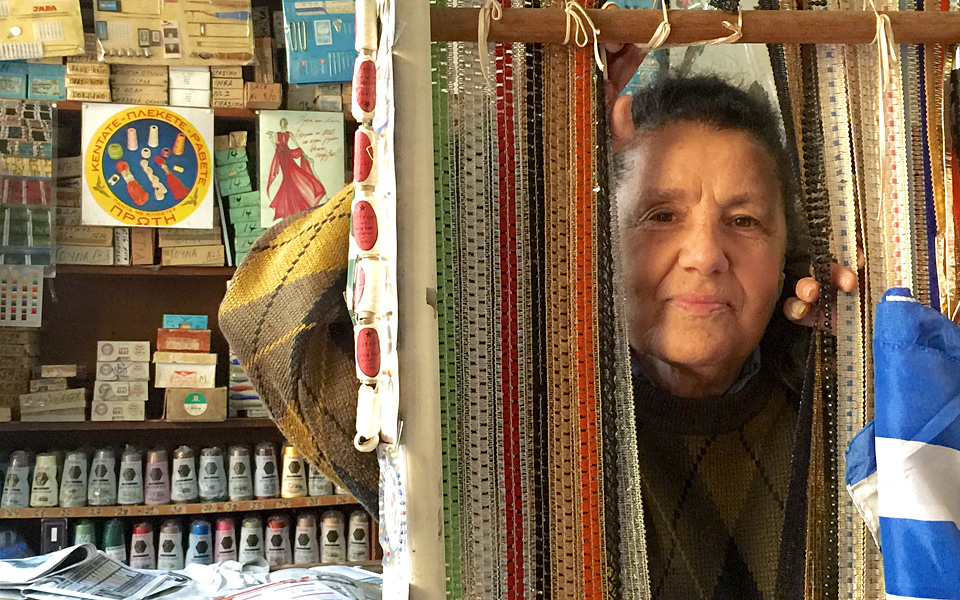
MARIA ANGELOPOULOU
Haberdasher, 100% Athenian
Maria grew up among strings, buttons and ribbons in the tailorware wholesalers her father opened after completing his military service in 1925. The store is still located in the same spot, on Agias Irinis Square. “We’ve been Athenian for seven generations. I saw the columns right after I was born,” she says, referring to the Parthenon, under the shadow of which she grew up, in Omonia Square.
“Most of the wares sold here have been discontinued,” she says, reaching in one of the drawers, way up near the ceiling and producing a yellowed, beaten box containing cufflinks of all colors. Her father, she claims, imported them from France in 1936. As a real Athenian, she refuses to leave the city center, even in her spare time. A nature walk for Maria means a stroll around the Acropolis. Her favorite walking spot is the pedestrian street that extends from Apostolou Pavlou to Dionyssiou Areopagitou streets, designed by the acclaimed architect Dimitris Pikionis. She always stops at the church of Agios Dimitrios Loumbardiaris, restored by Pikionis, to light a candle before climbing to the top of Filopappou Hill, to reach “a small plateau, with the most enchanting view of the Acropolis you could ever imagine.”
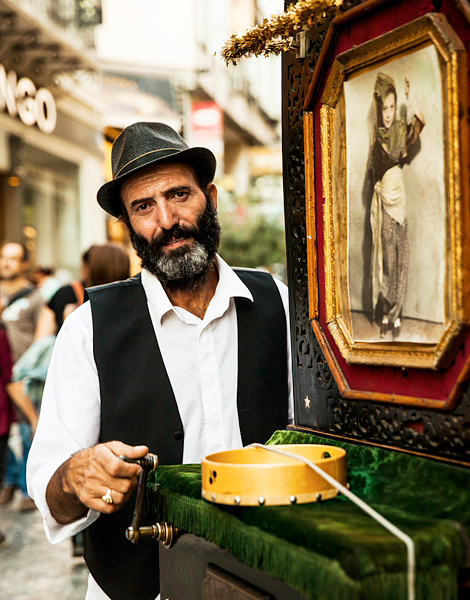
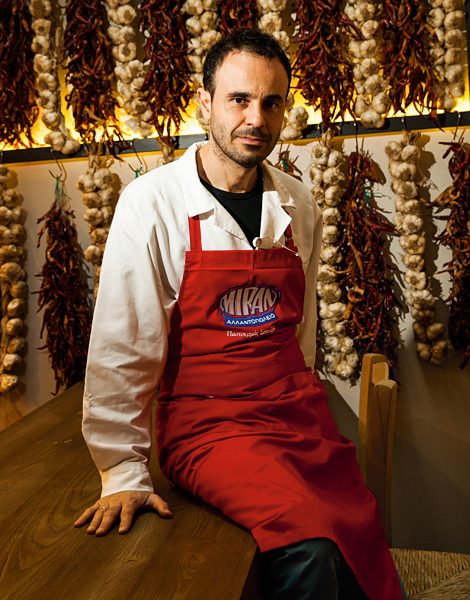
GIORGOS KIZILIS
Turning the music of history
“It’s an 1884 Turconi,” says Giorgos Kizilis, stroking the wood of the street organ. If I were an expert, I would be impressed by the mention of this particular brand, considered to be the Ferrari of street organs. But Giorgos, who every day paces up and down Ermou Street, is no expert himself either. It is as if he owned a supercar, which he drives not because he wants to, but because he must. At nightfall, he “parks” his organ in a city center underground garage and takes the metro home, exhausted from his 15-hour working day. “I’m no pro. I became an organ grinder out of necessity,” he says, turning the hand crank of the barrel piano, filling the air with music from the spinning metal tube. This street organ is one the very few left in Greece. At the beginning of the 20th century, thousands plowed the streets of Athens. The barrel organ was a means of entertainment.
“Its repertoire consists of songs from Istanbul. Old Athenians recognize them. I planned to put in some modern songs, but the maker in Thessaloniki asked me for €1,200 for the work. I told him I’d be back when I had won the lottery,” says Giorgos. He used to work as an electrician on a merchant ship, but after being laid off, he put the old street organ, which had been gathering dust in a corner of his house, back into service.
It used to belong to his father-in-law, passed on through the generations. “None of them had ever been an organ grinder, just collectors. I’m the first to have taken it out on the streets.” Today, the street organ provides his only income. “On a good day, I can make €20.” He lives in Keratsini, a neighborhood near the port of Piraeus, and his son is unemployed. He likes neighborhoods with a view of the sea and Piraeus, where “you can still see kids playing ball in the streets.”
MIRAN KOUROUNLIAN
The pastourma king
In the 1990s, Miran Kourounlian inherited this historic pastourma shop, founded by his grandfather upon his arrival from Asia Minor in 1922, at 45 Evripidou Street. For almost a century now, the store has been known for the fragrant, pungent smells of peppered pastrami, garlic and curry. “Please come in! Try the pastrami!” shouts an employee standing in the doorway. “Pastrami is dried meat, cured in paprika paste. You could call it eastern prosciutto,” Miran explains.
“Some elderly customers still come to the store, although their eyesight fails them, to buy sujuk and pastrami. We could never imagine leaving this place and the history tied to it,” he says, offering customers and curious tourists fresh sausages from the large fridges, which contain over 400 kinds. Spending time in Miran’s store is effortless, thanks to the tables in the back room. Some of the tables are located under an atrium, illuminated by lamps made out of pumpkins. “We also serve tsipouro, if anybody feels like an amuse-gueule.”
“We stock ten kinds of pastrami, camel, sheep, buffalo and odorless, spicy or medium. My personal favorite is camel pastrami. To foreign tourists, I always suggest buffalo pastrami, cut in thin slices and specially packed, but also our air-cured sujuk sausage and buffalo kavourma from Kerkini, in Serres, northern Greece.”
Miran’s favorite habit consists of walking all the way up Voulis Street and visiting the antique shops, searching for hours on end for rare trinkets. Every first-time visitor to Athens, he maintains, should make it to Savvas’ on Mitropoleos Street and give the pastrami pie a shot.
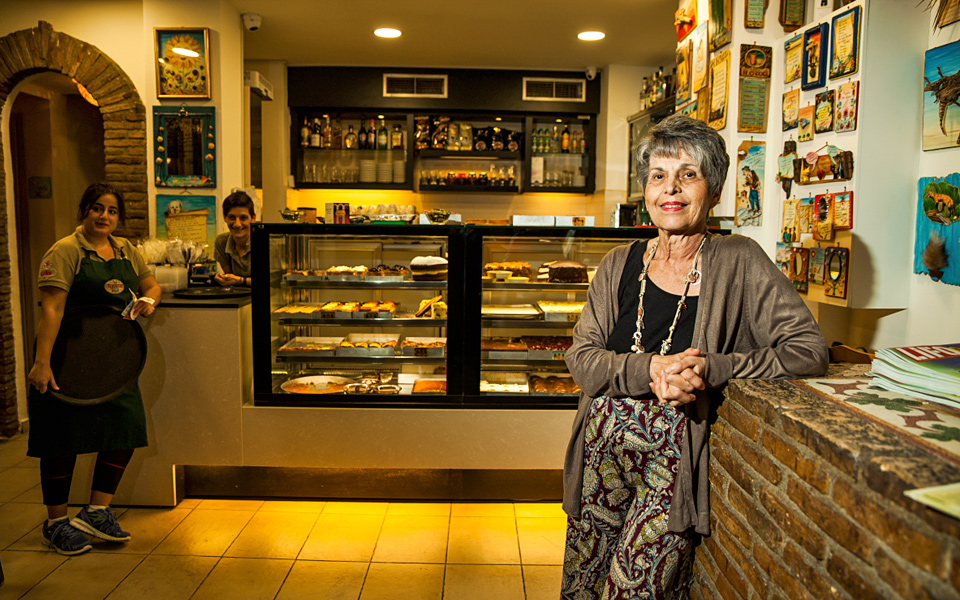
ALIKI KATSIKARI
A sweet tradition in Psyrri
Nineteen years ago, Aliki Katsikari opened Serbetia, a small traditional cafe and pastry shop on Aischylou Street in Psyrri, offering over 30 types of fresh pastries daily. “In the beginning, I used to bake everything myself. Now, my daughter has taken over.”
Originally located on the ground floor of a neoclassical building, the shop has now expanded next door, while all the pastries are baked on the first floor. “Everything here is handmade. Our recipes are based on my grandmother’s knowhow,” says Aliki, while the waiter serves a very generous scoop of kaymak ice cream with Turkish kanafeh on a plate.
Her mother-in-law (the aforementioned grandmother) was originally from Smyrna (present-day Izmir in Turkey). She came to Athens after the Greek–Turkish war in 1922 and settled in Ymittos. “Like most women from Smyrna, she was a gifted cook,” says Aliki. She passed on the recipes to her son and daughter-in-law, who opened Serbetika, but also to her granddaughter Maria, who has taken over all confectionary duties.
“We have come up with our own creations, like bananato, a product of Maria’s experiments, which have become a hit with customers,” says Aliki, serving the dish, comprising thick chocolate, spices, banana and cookies. “Galaktoboureko remains an all-time favorite.” This was one of the first items sold in the store’s early days. “Psyrri neighborhood was then filled with small manufacturing businesses. We opened right when the area started to change, with businesses closing and small restaurants and bars opening up. Today, the visitor can still catch a glimpse of the past. The old Athenian houses are still beautiful, notwithstanding their dilapidated state. Today I like the neighborhood better than in the old days.”
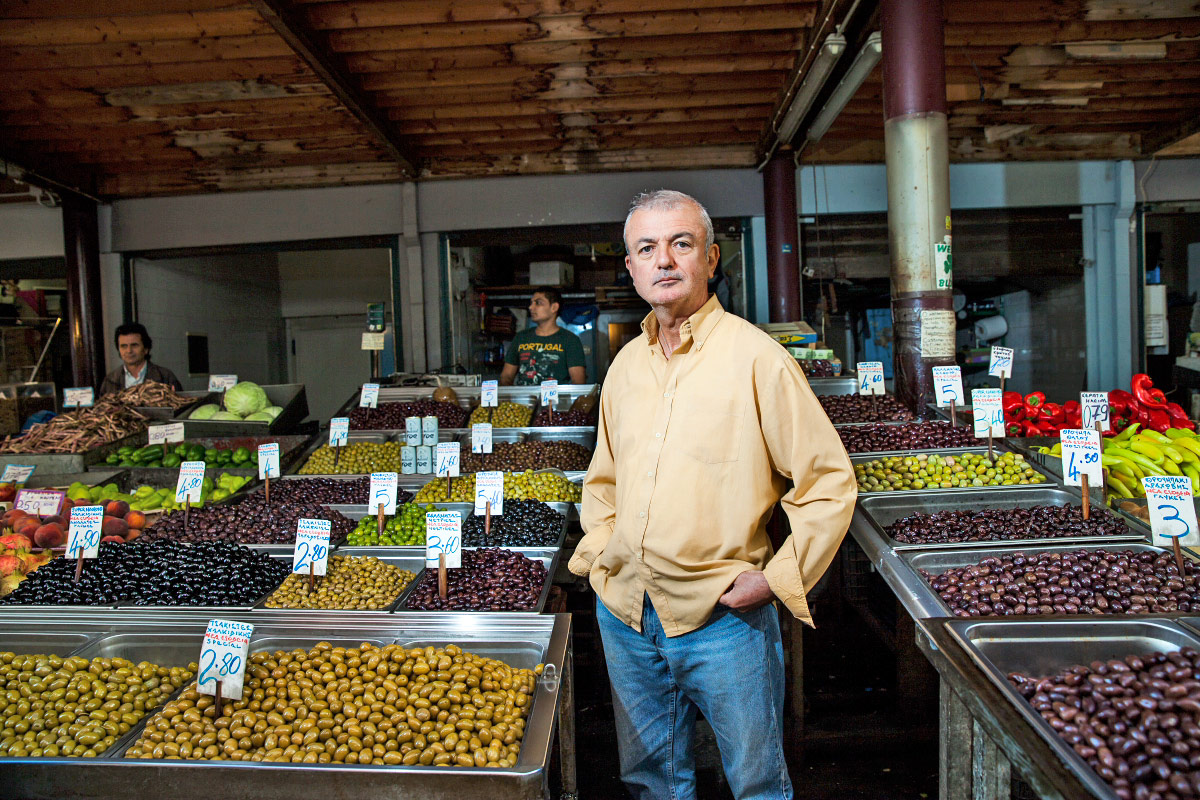
GIORGOS VALKANAS
The central market’s olive master
Giorgos Valkanas is a doyen of the Varvakios, Athens’ central market. He grew up in Plaka and for 30-odd years, his alarm clock has rung a little after five in the morning. Before sunrise, Giorgos organizes his stalls on Armodiou Street. Large, deep pans are filled with over 30 kinds of olives from every corner of Greece, including cut olives; throuba; pitless olives; olives stuffed with green peppers, capers, garlic or almonds; sliced; with salt or without.
“Tourists usually ask for dry martini olives,” he says, dipping his ladle in a pan marked “Halkidiki Super Mammoth,” filled to the brim with firm, green olives. They are so big that a whole one could not fit in a person’s mouth.
Tourists nibble on them during their strolls in the center. After a short tasting, they choose one or two kinds, sold in special sealed containers, ideal for storing in airplane luggage. “What do you usually suggest?” I ask him. “Kalamata olives. You can find them everywhere, but I take a special interest in their preparation. They’re matured in brine and red wine vinegar from the vineyards of Lakonia and extra virgin oil from Sparta.”
His favorite walk is on the Acropolis foothills. Early in the morning, at around 06:30, he walks through Plaka, “before the tourists wake up, the stores open and all the fuss.” In the Anafiotika district, he still recognizes images from the neighborhood he grew up in. “This is still a quiet area, with narrow streets, like those of an island in the Cyclades. The yards are whitewashed and the air smells of fresh laundry, drying in the sun.”
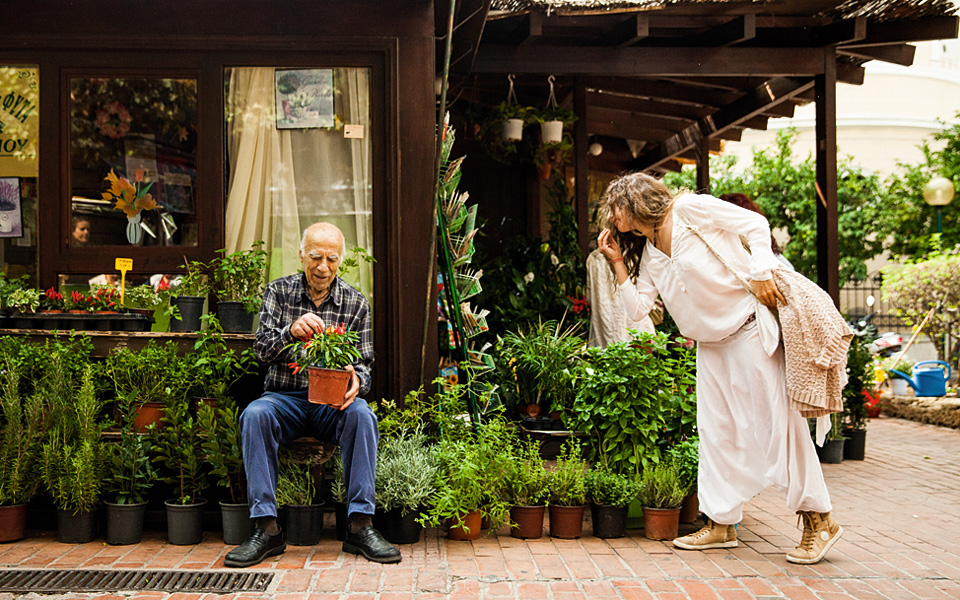
PAVLOS VASILIOU
The last of the florists
Pavlos Vasiliou is the last of the 50 florists that once thrived in Agia Irini Square. He witnessed the transformation of the square from a flower and textile center to a hipster-magnet, thanks to its cafes and bars.
Although 82 years old, Pavlos opens his fragrant store, named Pavlos’ Fiore, every morning. The small wooden pavilion was originally just an aluminum shed, but eight years ago Athens municipality decided to fund its rebuilding. It is his “haven.” If you sit next to the heater in one of the square’s cafes that opened in the past five years, in buildings that once housed textile stores, you’ll see Pavlos arranging his flowers, watering his cyclamens, smelling his gardenias and lifting heavy flower pots with shrubs, like a 20 year old. I spotted him immersed in deep discussion with foreign tourists, even though his English vocabulary does not exceed a dozen words.
“We also sell vacuum-sealed flower and herb seeds, specially for tourists.” For decades on end, he has enjoyed the patronage of prime ministers, diplomats, mayors and ship owners, who used to send their employees from far away, or come in person, to buy freshly cut flowers. “Well-known personalities have frequented my store,” says Pavlos, rattling out the names of many of his famous customers. “Prime ministers used to stroll in the square. They greeted me and I gave them gardenias,” he remembers.
“I’ve escaped the ravages of time and I insist on keeping my store, although young people don’t love flowers anymore. Our time lacks feelings. Things are not what they used to be.” His favorite walk starts from Apostolou Pavlou Street in Thissio and takes him to Agia Irini Square, from where “they’ll have to carry me, feet first, to the other world. Until then, I’m going nowhere. I wouldn’t trade this place for anything. That’s why I’ve lasted here for 70 years, because this place doesn’t compare with any other in Athens.”
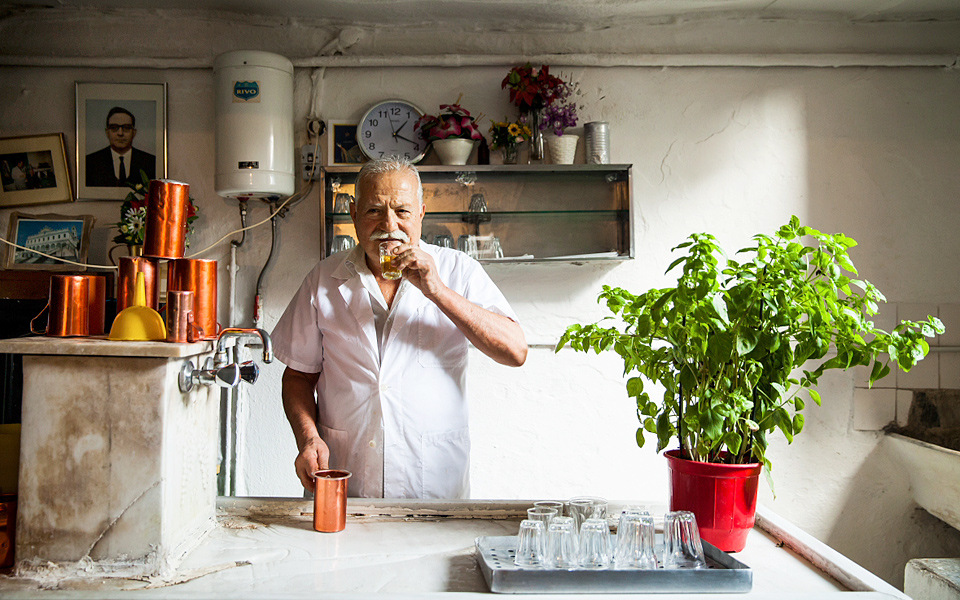
DIMITRIS KOKOLIOS
Feeding Athens since 1875
Dimitris Kololios is the owner and a hardworking employee of the underground eatery located on the corner of Theatrou and Sokratous streets, right next to the Varvakios, Athens’ central market. To enter the premises, you have to duck in order not to hit your head on the low lentil. Well-informed Athenians know how to find the place, which has no sign above the door. Hot steam coming out of cooking pots welcomes the customer to Diporto, or “Two Doors,” a name derived from the fact that it has two entrances.
“My grandfather started the business, my father kept it going and now it’s my turn. Nothing has changed in this restaurant since 1875,” says Kyr Mitsos, as Dimitris is nicknamed by his customers. Although he cooks from early morning to late afternoon, his white apron remains spotless.
When he first climbed down the establishment’s stairs, he was just 13 years old and the eatery belonged to his father. Customers sat on the very same chairs, drinking resinated wine from the same barrels, eating the same traditional Greek recipes: fava beans, meat soup or cut pasta with beef, boiled vegetables and soup, just like his mother used to make.
When a customer sits at a table, Kyr Mitsos approaches to spread a versatile sheet of paper, in lieu of a tablecloth. He is known for his multitasking skills: he stirs the pots, flips the fresh fish on the grill, arranges the orders, serves the dishes and fills the metal pitchers with wine. Another talent of his is mixing up the customers.
When the place is jam packed, he points to empty seats at tables. “Food is a team sport; you don’t want to eat alone. Friendships, as well as love affairs, have been forged in here. There are many who came in alone, left in love and returned as couples.” This is the only place in Athens where you are likely to see well-known people sitting beside the homeless. “Many celebrities are regulars. I won’t name names as we pride ourselves on our discretion,” says Dimitris. His favorite spot in Athens is “wherever, sitting at a table with old friends.”
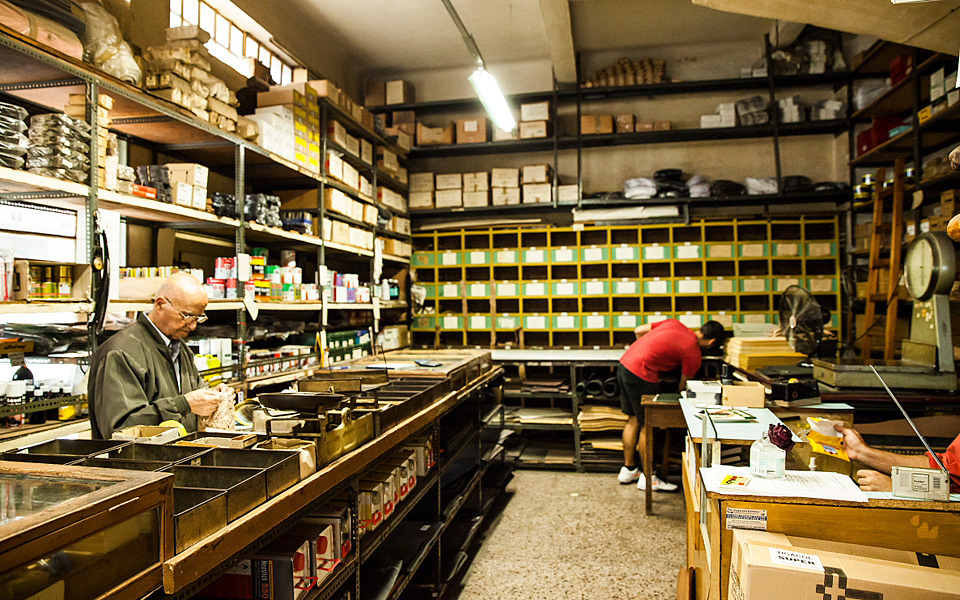
KOSTAS PANAGOPOULOS
The last shoemaker supplies store in Psyrri
At 82, Kostas Panagopoulos owns the last shoemaker supplies store in Psyrri. Located in a 1930s building on Karaiskaki Street that smells of leather, he still sells everything pertaining to shoes and their upkeep. Although he stocks every item needed to make a shoe, he doesn’t fix them. “I’m a wholesaler, not a cobbler.” Cobblers are his customers. Today, Kostas sells to small manufacturers and makers.
“I’ve been here for 62 years. This area is my heart and soul.” He can still remember Psyrri when the neighborhood was “Athens’ shoe capital,” with over 80 manufacturing plants, of which just five or six survive. “The neighborhood was heavily populated, in addition to its businesses. In 1980, I conducted a small survey and counted 80 households. Today, fewer than 40 remain.”
His favorite area in Athens is the pedestrianized street in Thissio and Filopappos Hill. “Us old timers like it there, these neighborhoods are ancient, they’re our point of reference. Keramikos is an up-and-coming area. Artists and creative people have flocked to it in recent years, opening bars and restaurants. It’s gotten quite noisy. That’s a spot for young people, not for us who are almost as ancient as the Acropolis.”
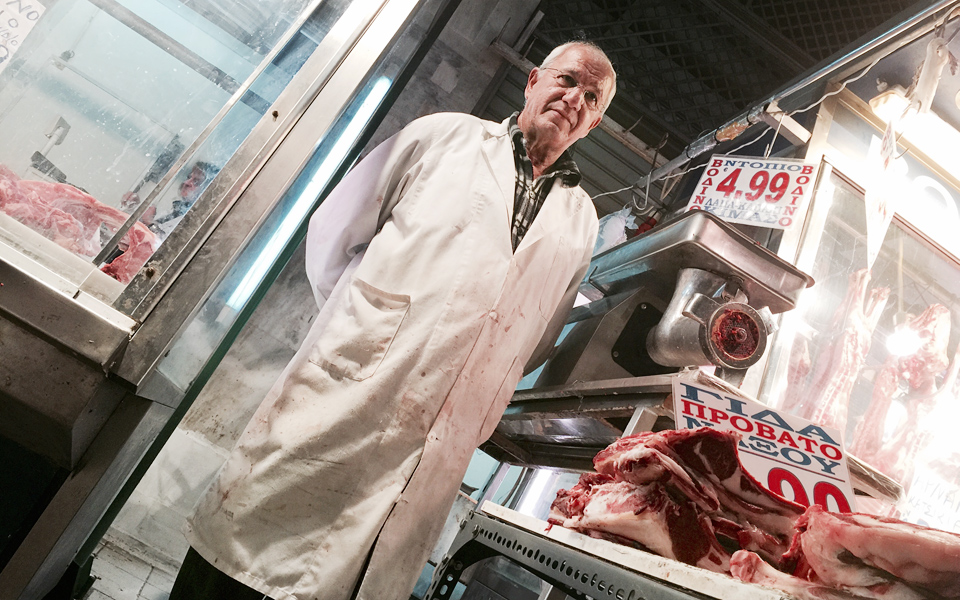
CHRISTOS DRENIOS
Fifty years a butcher in the Varvakios
When he started working in the Varvakios, Athens’ central market, at the age of 13, he wore shorts. He’s now 61. He can remember the market without a roof, with “the rain falling on our heads. Back then the Varvakios was filled with young boys, who worked as assistants in order to learn the trade. Plastic bags were unheard of and we used to wrap the meat in paper and tie it with string. I then asked the butcher whom I was working for if this was a good trade. He told me: ‘My boy, even if you scratch firewood, you’ll find something to eat.’ This job fed me, my kids and grandchildren. It’s tough work and you need physical strength and stamina. Check out the tattoos,” he says, pointing to the scars on his palms from the butcher knives. “Occupational hazards. They exist.”
“For tourists, the Varvakios is a gory sight. They take pictures of lambs’ heads and guts, a rare sight in the world. Only Greeks and Turks eat them.” The numerous fish pictures, hanging on the walls of his shop behind the till, would be more suited to a fishmonger’s than a butcher’s. They betray his fanatical passion for fishing, a hobby that pulls him every weekend to the seashore in Anavyssos, southeast of Athens.
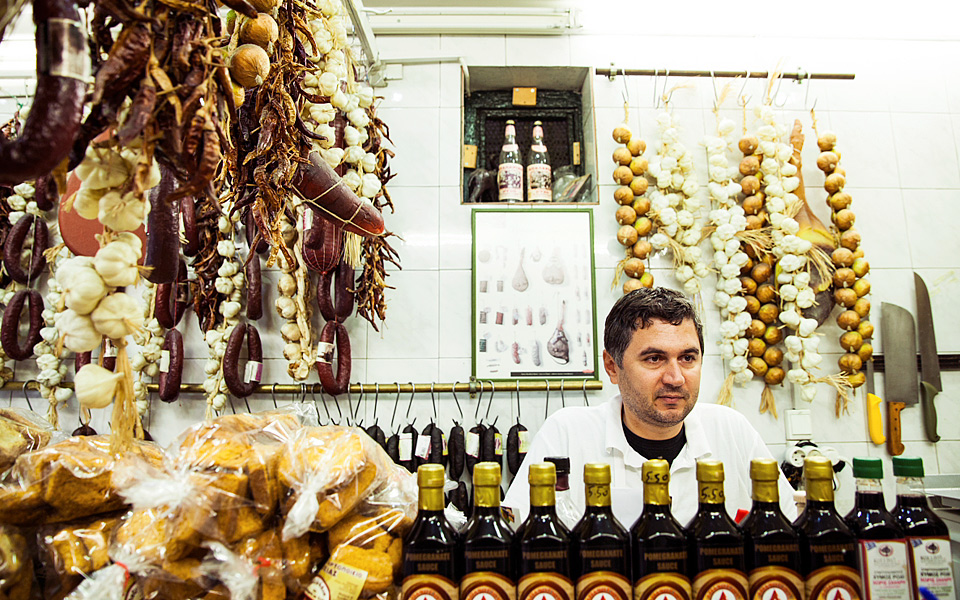
FANIS THEODOROPOULOS
Keeping the roots of sujuk alive
He may be called Fanis Theodoropoulos, but everybody knows him as Arapian. He is the third generation of the family that runs the well-known sausage shop at 41 Evripidou Street that has specialized in Cappadocian-style pastrami and sujuk (or soutzouki in Greek) since 1935. A year ago, the 38-year-old deli owner opened the Karamanlidika tou Fani eatery (1 Sokratous and 52 Evripidou streets), offering deli treats, award-winning roasted and smoked meats as well as traditional products from all over the country, like hard-to-find Drama pastrami.
“How do we spot fresh sujuk? It’s more tender, making it the best for frying. Aged sujuk is best consumed cold,” says Theodoropoulos. His store specializes in three types of sujuk: “The karamanlidiko is extra hot, we call it the Rocket; Cappadocia sujuk, which looks like it’s been woven; and politiko (Istanbul) sujuk. I can guarantee the quality, and from then on it’s a matter of taste.”
“Athens to me is a walk in the streets of Metaxourgio, Keramikos and Monastiraki. I’m a child of the city center.” Metaxourgio is his favorite spot for a Sunday lunch, after watching a theater matinee with his son. In Monastiraki, Fanis likes “to hunt for treasure in the antique shops of Avyssinias Square,” and in Keramikos, when the weather is good, he enjoys walks in the archaeological site with his family.

